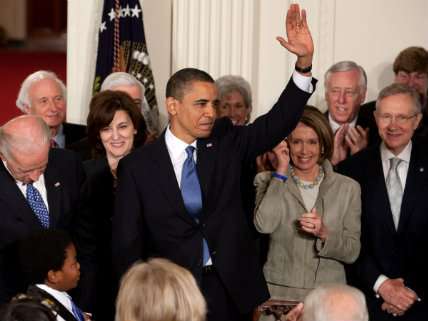Why Lack of Political Support is a Problem For Obamacare

Over at The Washington Post, editorial writer Stephen Stromberg notes my current print-edition feature on the challenges ahead for Obamacare and the ways the administration has either exaggerated the health law's successes or downplayed its potential problems.
Stromberg argues that my piece is "ultimately too negative," but we do have a few points of agreement, mainly that "President Obama and his staff oversold the law, promising coverage expansion, cost containment, and unrealistic levels of consumer choice." In addition to laying out remaining problems for the law and noting the ways that the disastrous launch had helped shaped expectations for later performance, that was one of the major points of the piece: that even when the administration has reasonably good news or numbers on its side, it has often chosen to exaggerate its successes, and to declare them with more confidence than is warranted.
I want to zero in on a particular area of disagreement. Stromberg does not seem to think it is a particularly large problem for the law that it is still struggling in the court of public opinion. The law's low polls, he writes, say "little about its inherent merits."
I tend to think that bad polls are at least potentially a bigger problem. For one thing, poor popularity ratings suggest that even if one believes the law is a success, it's a success that's not widely felt. Its benefits are going either unnoticed or actively disliked by the majority of people, which, with a law the size and scope of Obamacare, indicates that it may not be as successful as intended.
More importantly, though, is that for a law to work—or even survive—it must maintain a certain level of political support, even and perhaps especially if you think, as I sense Stromberg does, that it's already a moderate policy success that just needs more time to work out the kinks. An unpopular law is an unstable law, and it is one that is constantly under threat of change or perhaps even outright repeal.
Just as a general matter, it's hard to maintain a law when the party behind it loses elections because of it. That's probably what happened in 2010, when Democrats lost the House. A 2012 paper by a team of political scientists found that Democrats may have lost control of the lower chamber (and thus the ability to, say, tweak the law during key implementation years) as a result of voting for the health law.
It's true that there's not perfect precedent for the total repeal of a law as sweeping as Obamacare. But major health reforms have been wiped from the books before. The Medicare Catastrophic Coverage Act, for example, was passed in 1988. A year and a half later, the law, commonly known as Cat Care, was repealed after extremely angry senior citizens refused to pay a tax financing an expansion of the health program's catastrophic coverage.
As a 1990 post-mortem of the law in Health Affairs said, "a retrenchment of this magnitude is unprecedented in postwar social welfare policy." It had never happened before, which meant that no one really thought it was possible. But it did happen. The public pressure was just too strong.
Do I think full repeal is a realistic threat to Obamacare? It does seem somewhat unlikely, especially since polls suggest that support for full repeal is smaller than support for changing the law. In any case, it would be somewhat unprecedented (Obamacare is much more sweeping than Cat Care was). But as the Cat Care incident shows, unlikely and unprecedented events do happen.
And full repeal is not the only plausible way that a lack of public support could affect Obamacare. A law does not have to be repealed to be changed, and some sort of revamp, whether through a series of smaller tweaks or in the context of a larger rethinking and reworking of the nation's entitlements, does seem quite possible.
Republicans have repeatedly stated their commitment to repealing or radically revamping Obamacare somehow. What they'll actually do if given power to make changes is less clear, but it seems unlikely that they will simply leave it as is. And since the launch of the exchanges last fall, we've even seen several Democrats, ostensibly the foundation of the law's political support, distancing themselves from the law and instead talking largely about "fixing" it. The party's own voters don't appear to be particularly motivated by the health law.
If a law of this scale is to be judged as any sort of sustainable success, it will need to build broader political support—something it doesn't seem likely to gain when even representatives of the party behind it are implicitly describing it as broken.


Show Comments (48)